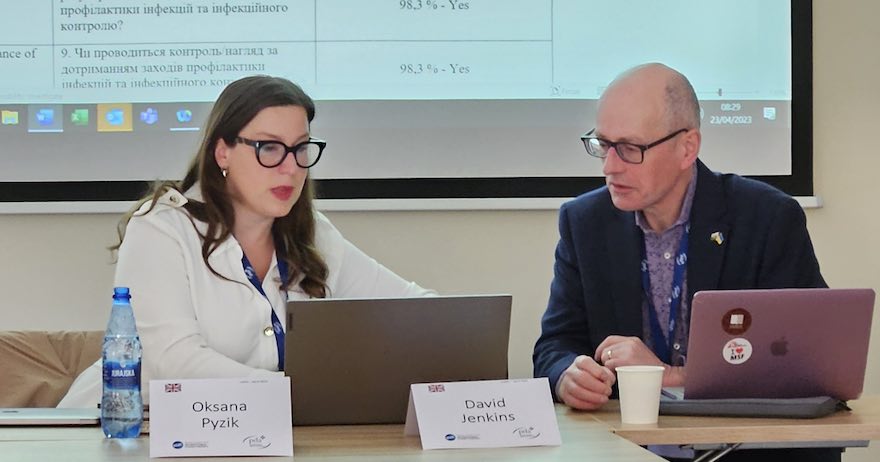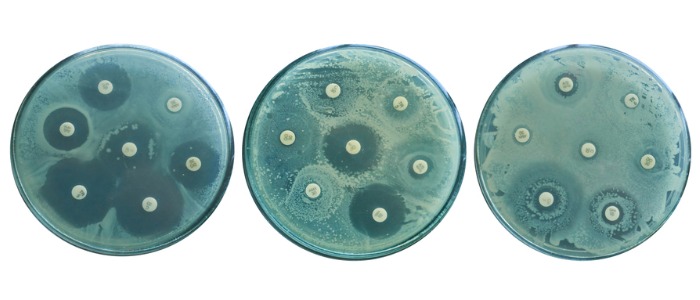PDA and BSAC link UK and Ukrainian clinicians to discuss antimicrobial stewardship
In News
Follow this topic
Bookmark
Record learning outcomes
It’s a beautiful Spring day in Lublin in the east of Poland. On the top floor of the city’s Medical University, clinicians from the UK and Ukraine are discussing the global threat of antimicrobial resistance.
Over a late April weekend, the group will conduct a stocktake of antimicrobial stewardship and infection prevention policies, guidelines and practice, and microbiology laboratory capacity throughout Ukraine with the aim of identifying areas for improvement where UK colleagues might support development in Ukraine.
The meeting is the latest development of what started as the ‘Medicines to Ukraine’ campaign, initiated by EPhEU, the Europe-wide association of employed pharmacists, of which the Pharmacists’ Defence Association is a member and PDA chairman Mark Koziol the secretary general.
It’s been quite a journey since the campaign started nine months ago. Posters in pharmacies across nine European countries have now raised more than £3m in cash donations, which have been used to purchase medicines and other medical supplies to order for clinicians in Ukraine. It’s a small, but significant, addition to the humanitarian effort supporting the country’s health system, which remains under strain as the conflict initiated by Russia enters its second year.
“As the scheme developed, we had our eyes opened to what the real needs were,” Mark says. “Until I visited Ukraine, I hadn’t realised there were a lot of snake oil salesmen looking to make money out of the war. The Ukrainians were sitting there, thinking here’s another wise guy, but when I asked what else we might help with, they said they had a lot of problems with AMR. At the PDA, we were working up a new policy dimension and I’d done a series of CPD episodes around AMR, so I was able to engage them in a conversation. The body language changed instantly.”
After understanding the issues, particularly with the breakdown of information and control during the transporting of wounded soldiers, and the prevalence of significant infections as a result, Mark started thinking about how he might help. A chance reading by one of the UK’s regional antimicrobial stewardship leads of P3pharmacy’s story last year led to contact with the British Association of Antimicrobial Chemotherapy (BSAC), an organisation based, coincidentally, hundreds of yards from the PDA’s offices in Birmingham.
“It was clear that BSAC had a similar strategic interest,” Mark says. “A lot of the substantive orders we are sending to Ukraine contain antibiotics. The expertise and knowledge of how you should and shouldn’t use them is hand in glove. As pharmacists we play an important part, but BSAC is a multidisciplinary team and the solution is a multidisciplinary one.”
The weekend meeting is, therefore, a joint initiative by the PDA and BSAC, with logistical support in Lublin from PDA’s equivalent in Poland, ZZPF. The clinicians around the table include clinical and medical microbiologists, nurses, pharmacists, epidemiologists, an oncologist, a paediatrician. The work has attracted interest from both Governments, who are represented by officials.
A global health emergency often worsened by conflict
The meeting is timely. While antimicrobial resistance is a global health emergency, the clinical challenges faced in different countries vary widely and depend, among other things, on the capacity and technology available in medical microbiology laboratories, the experience and knowledge of the clinicians involved, the ability to control cross-infections and antimicrobial stewardship practice. It is often worsened by conflict.
The literature suggests that Ukraine had a significant problem with antimicrobial resistance, especially in infections acquired in hospitals, even before the Russian invasion, with the widespread use of antibiotics in the country’s dominant agriculture sector exacerbating the situation. There are now reports of a large increase in infections caused by antibiotic-resistant bacteria, both in conflict casualties and non-casualty patients.
Just last month, France24 reported research from doctors in Germany that found that out of 47 wounded patients evacuated to Berlin’s Charite University Hospital for treatment last year, 14 suffering from gunshot and/or blast wounds, including three children and one soldier, had injuries infected with multidrug-resistant bacteria.
Data assembled by BSAC and the PDA as background for the meeting notes that a recent survey of infections in five hospitals in Kyiv between 2014 and 2016 reported that 28 per cent of Staphylococcus aureus isolates were methicillin-resistant (MRSA), while 14 per cent of enterococci were resistant to vancomycin and 35 per cent of all Enterobacterales were resistant to third generation cephalosporins, with the highest rates in Klebsiella pneumoniae (54 per cent) and E. coli (32 per cent).
All this means that a high proportion of hospital acquired infections (HAIs) are difficult to treat, leading to slow recovery, prolonged hospital stays or, worse, death, while the need to use reserve antibiotics potentially makes resistance even more of a problem.
As the meeting gets underway, there is a stark reminder of the conflict across the border less than 60 miles away as last-minute paperwork issues mean the largely female Ukrainian delegation comprises eight clinicians, rather than the expected ten. With widely different cultures and experiences and comparisons are drawn between health systems and even health professional roles and responsibilities, the pace of the conversation is slow at first.
The hours of discussion, which start with tributes to the response of Ukrainian society to Russia’s aggression, are conducted with great civility – two Ukrainian pharmacy students now based at the University have volunteered to act as translators; one of the other delegates assists too.
Looking for opportunities to accelerate transformation
It’s a wide-ranging conversation. Subjects include perceptions of the scale and nature of the issue, difficulties in collecting information, relationships between (and hierarchies of) clinicians, the status of infection prevention and control processes in hospitals, the nature and utilisation of the workforce, the role of national and regional government in goalsetting, professional education (formation and postgraduate), resourcing, access to medicines, procurement, laboratory infrastructure across Ukraine, access to timely reporting, decision-making when antibiotic prescribing, and the immediate and ongoing impact of the war.

Some issues are resonant of a transforming health system; until 1996 the system was operating firmly in the soviet-mould. The dominance of some clinicians in decision-making over antibiotic choice, for example, are an echo of how surgeons held sway not that long ago in the UK. The challenges faced by the non-medical clinicians from Ukraine remind their UK counterparts how their own knowledge and skills have increasingly been recognised within multidisciplinary teams over the last 20 years.
The group explores opportunities to accelerate the transformation already underway in Ukraine, using UK experiences (and past mistakes) to guide the leadership approaches needed to tackle the human problem that is AMR, made worse by the number and flow of casualties across the country.
Oksana Pyzik, global engagement lead at the UCL School of Pharmacy and Commonwealth Pharmacists’ Association Board Trustee, who chaired the meeting, said discussions were challenging. “We heard from our Ukrainian colleagues about the worsening problem of antimicrobial resistance, where antibiotics are no longer working. Where the level of technology available makes it very difficult to assess what treatments would be appropriate because you are not getting the results on time.
“They’re operating in a war zone, even in the western cities away from the front line. Imagine how much more stress is added by not having the tools you need. One of the most harrowing things we heard was having to guess what treatment would be effective, it not working, and amputations having to be done in non-sterile situations where the prophylaxis is also not working.
“It will take a huge multidisciplinary response, Government and society, not just in Ukraine but with all our partners and allies. Antimicrobial resistance is a global priority. It’s not something we can run away from.”
The language issues, even with translators, was an obstacle. “However, because health workers understand what a critical role they play in the war effort – a strong health system in a strong society gives them the best chance to survive as a country – the level of engagement, interest and trying to learn was emotionally moving and inspiring,” Oksana says. “It strengthened the resolve of all members in thinking we had the right group of young leaders in the room, and the realisation of the importance of this transcended the obstacles to conversations.”
“The challenge is not just about supplying antibiotics, says David Jenkins, president of BSAC and a consultant medical microbiologist and infection prevention specialist Leicester University Hospitals Trust. “We want to address resistance at source through better infection prevention practice, we want to improve laboratory practice and capacity so these organisms can be identified in the timely manner and make sure the right antibiotic is being used at the right time – that’s antimicrobial stewardship.
“In countries where these things are not well developed, and that includes Ukraine even before the conflict, they cannot just be switched on overnight. They require significant planning, training and education as well as physical resources.”
“We got a great representative group from many cities across Ukraine to come over. We’ve had a good one and a half days intense discussions to much better understand the situation and how we can potentially support colleagues in Ukraine, not just to address their current problems, but to develop the situation once the conflict is over to ensure these gains are consolidated.
“This is important for Ukraine, but also for the rest of Europe. Resistance is an international problem; it doesn’t recognise borders, and spreads from country to country via genes at a molecular level, via bacteria moving from person to person, people carrying organisms move internationally as well. The only thing we have in our favour is our intelligence and we need to use that effectively.”
British Society of Antimicrobial Chemotherapy
BSAC is a multi-professional organisation aimed at improving the use of antimicrobials and particularly addressing the threat of antimicrobial resistance. ‘British by name but global by nature’ (around half of its 5,000 members work outside the UK around the world), BSAC operates through education and training programmes, by publishing information about the science of antimicrobials through its journals, and through its Global Antimicrobial Stewardship Accreditation Scheme, a quality improvement programme to drive up standards, which is currently operating through 10 beacon sites. BSAC is free to join; further information can be found here.
The Medicines to Ukraine programme is ongoing. Find out more and donate here.


